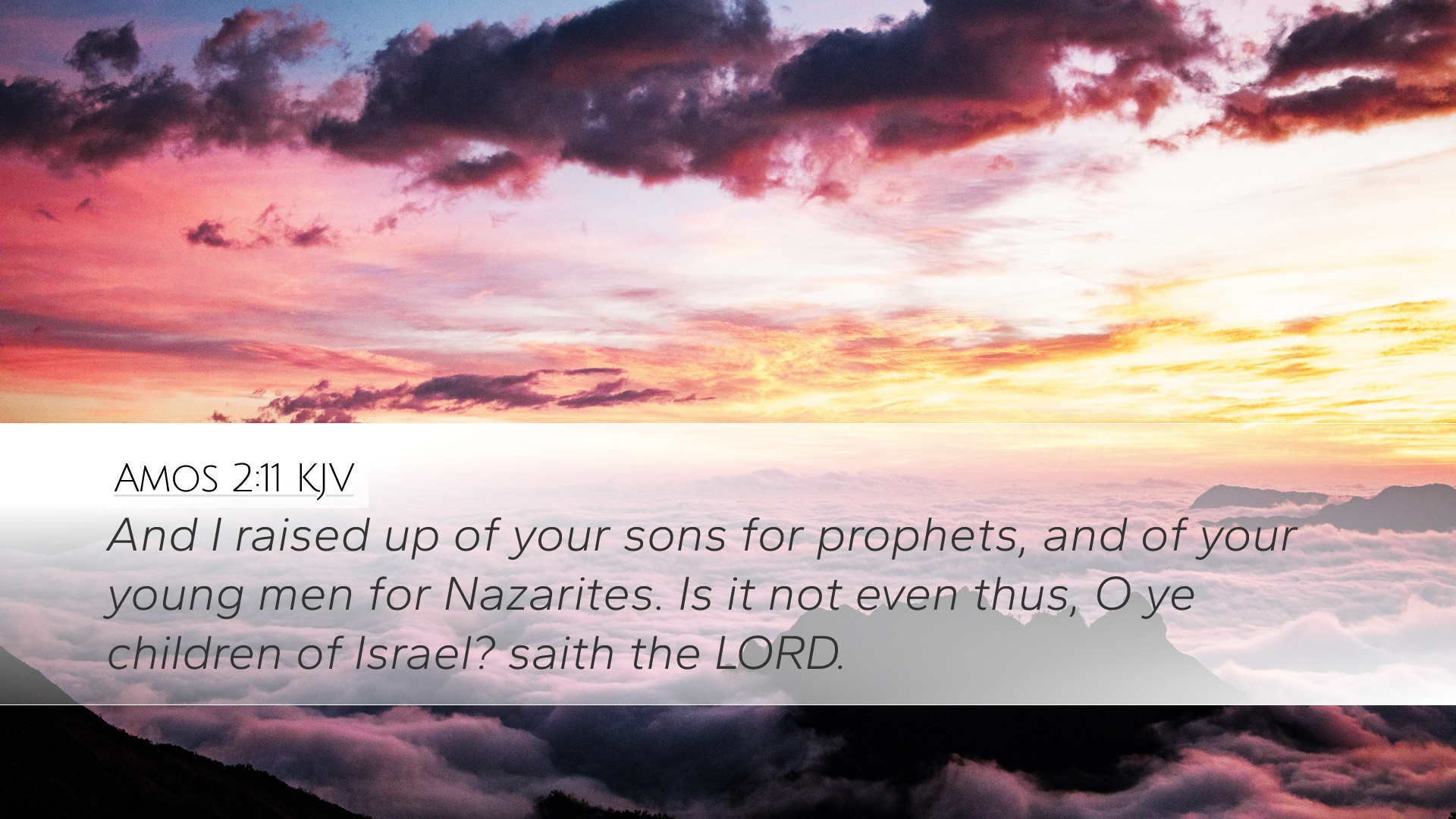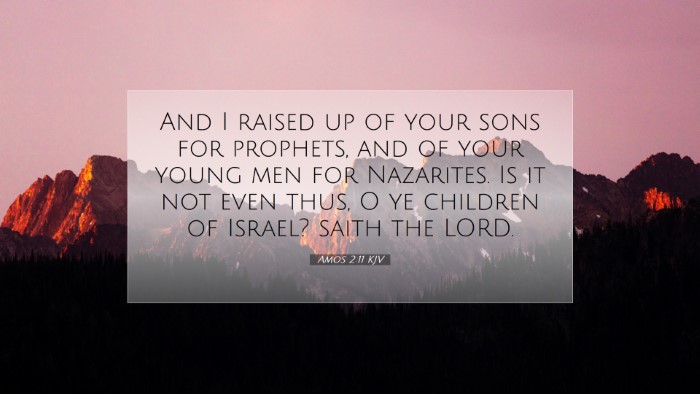Old Testament
Genesis Exodus Leviticus Numbers Deuteronomy Joshua Judges Ruth 1 Samuel 2 Samuel 1 Kings 2 Kings 1 Chronicles 2 Chronicles Ezra Nehemiah Esther Job Psalms Proverbs Ecclesiastes Song of Solomon Isaiah Jeremiah Lamentations Ezekiel Daniel Hosea Joel Amos Obadiah Jonah Micah Nahum Habakkuk Zephaniah Haggai Zechariah MalachiAmos 2:11
Amos 2:11 KJV
And I raised up of your sons for prophets, and of your young men for Nazarites. Is it not even thus, O ye children of Israel? saith the LORD.
Amos 2:11 Bible Commentary
Commentary on Amos 2:11
Amos 2:11 states: "And I raised up of your sons for prophets, and of your young men for Nazarites. Is it not even thus, O ye children of Israel? saith the Lord."
Introduction
This verse from the book of Amos serves as a crucial turning point within the prophetic messages outlined in the Minor Prophets. In this commentary, we will explore insights from renowned public domain scholars including Matthew Henry, Albert Barnes, and Adam Clarke. The intent is to provide a rich theological context that is both enlightening and applicable to modern faith practices.
Contextual Background
Amos was one of the early prophets who ministered during a period of prosperity in Israel, yet his messages were filled with denunciations of social injustice, immorality, and a call to repentance. It is vital to understand the historical context in which Amos spoke, as it greatly enhances the interpretation of his message.
The Role of Prophets and Nazarites
In this verse, Amos highlights two distinct groups that God appointed among the Israelites:
- Prophets: Selected to convey God’s messages, guiding the people back to righteousness.
- Nazarites: Individuals set apart by vows, symbolizing dedication to God and a lifestyle of holiness.
Insights from Commentators
Matthew Henry's Commentary
Matthew Henry emphasizes that God's gifts of prophets and Nazarites were expressions of His grace and commitment to Israel. He remarked that “God's prophets were His advocates, warning His people against sin.” Henry highlights that the Lord’s raising of prophets illustrates both His care for the people and their consistent rejection of His messages.
Albert Barnes' Commentary
Albert Barnes notes the significance of the roles played by the prophets and Nazarites in Israel's spiritual life. He states that the presence of these individuals was a testament to God's persistent effort to engage Israel despite their obstinacy. Barnes interprets the question posed—“Is it not even thus?”—as a rhetorical device to challenge Israel to acknowledge the divine interventions in their history.
Adam Clarke's Commentary
Adam Clarke offers a more detailed exploration of the Nazarite vow, linking it to the holiness and separation expected from those who serve God. Clarke points out that these young men, by their lifestyle, were meant to reflect God's holiness, serving as a visible reminder to Israel. He underscores that the rejection of these prophets represents a tragic affront to divine benevolence.
Theological Implications
The ramifications of Amos 2:11 extend beyond mere historical observation. They provide vital insights into God’s character and His enduring desire for relationship with His people. The constant raising up of leaders for guidance points to God’s initiative to draw humanity into fellowship and righteousness, even amidst rebellion.
The prophets served not only as forecasters of future events but as advocates for present transformation, urging repentance and moral integrity. The parallel emphasis on Nazarites brings forth the call to holiness that is inherent in those who aspire to serve God authentically.
Contemporary Applications
The truths presented in Amos 2:11 can be compelling for pastors and congregations today. Here are a few applications drawn from the verse:
- Recognition of God’s Messengers: In today's context, it is essential to recognize and heed the voices God raises within congregations and communities, as they may bear divine messages crucial for spiritual health.
- Encouragement for Holiness: The legacy of the Nazarite vow should inspire modern believers to pursue lives set apart, reflecting God’s holiness in both private and public spheres.
- A Call to Repentance: Just as Israel was called to account for their failings, contemporary Christians must acknowledge areas of sin and seek genuine repentance and restoration.
Conclusion
Amos 2:11 serves as a poignant reminder of God's relentless pursuit of His people through prophets and exemplars of holiness. This commentary synthesizes perspectives from historical theologians to elucidate the depth of this one biblical verse. As believers strive to live authentically for God, may they remember their high calling and the grace that accompanies it.


